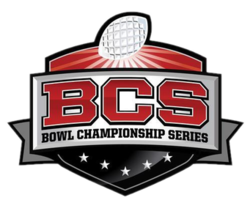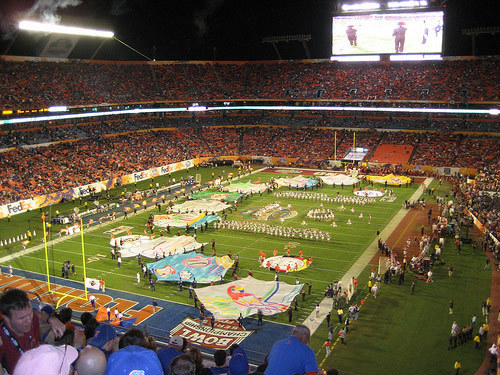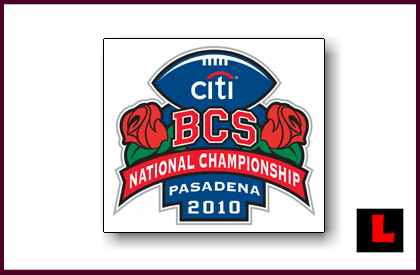Since the formation of the Bowl Championship Series, there have been several controversies regarding the schools selected to participate in the BCS National Championship Game. Most notably, following the 2003 season, the BCS ranking system selected the #3 ranked school in the Associated Press writers' poll, the University of Oklahoma, over the #1 ranked school in that poll, the University of Southern California, to participate in the National Championship Game (the Nokia Sugar Bowl) despite Oklahoma's decisive loss to Kansas State in the 2003 Big 12 Championship Game. 2003 is the only season, to date, since the inception of the BCS in which the national championship has been split, with Louisiana State University winning the BCS national championship and the University of Southern California winning the AP national championship and the FWAA national championship.
The BCS National Championship for the 2010 season at the University of Phoenix Stadium in Glendale, Arizona was held on January 10, 2011, sponsored by Tostitos, and televised by the ESPN television network. The game featured the #1 Auburn Tigers and the #2 Oregon Ducks and was won by Auburn 22-19.
The game was first played at the conclusion of the 1998 college football season in accordance with an agreement reached by the Big Ten and Pac-10 conferences and the Rose Bowl Game to join the members of the former "Bowl Alliance" to create the Bowl Championship Series. The Bowl Alliance and its predecessor, the Bowl Coalition, featured championship games from 1992 through 1997. However, these did not ensure a matchup between the top two ranked teams because of the lack of participation by the Big Ten and Pac-10.
The game was initially rotated among the four participating bowl games, the (Rose Bowl, Orange Bowl, Fiesta Bowl, and Sugar Bowl). However, beginning with the 2006 season, the BCS National Championship Game became a separate event played at the same site as a host bowl a week following New Year's Day.
^† Double overtime ^ ^‡ No 2004 BCS Champion due to NCAA sanctions against USC, nullifying participation and results. A June 6, 2011 decision of the BCS Presidential Oversight Committee, the 2004 championship will remain permanently vacant. Pursuant to NCAA sanctions, USC running back Reggie Bush was declared retroactively ineligible for the 2005 Orange Bowl. The same June 6, 2011 decision of the BCS Presidential Oversight Committee nullified USC's 2005 season participation in the 2006 Rose Bowl. However, since Texas defeated USC on the field, Texas is still recognized as the BCS National Champion for 2005. Participating conferences and personal awards listed within table here.
* Miami and Virginia Tech moved to the ACC in 2004. Nebraska moved to the Big 10 in 2011. No current member of the Big East has played in a BCS championship game.
Critics of the current BCS championship argue against the internal validity of the current BCS National Championship, which is awarded to the winner of a single postseason game, the BCS National Championship game. Critics lament that the participants in this game are decided based upon polls and computers; not by previous on-field competition as is this the case in other major sports and other levels of college football which employ playoff format championships. Often, the BCS system leads to controversies in which multiple teams finish seasons with equal records, and voters must distinguish the worthiness of their participation in the BCS National Championship game. Without providing any objective criteria for evaluation of these teams, the BCS also forces voters to impose their own standards and tiebreakers. Critics note that the system inherently fosters selection bias, and therefore, lacks external validity.
Controversies concerning inclusion in the BCS National Championship Game are numerous. In 2003, for example, USC was not included in the BCS Championship Game, but beat Michigan in the Rose Bowl and ended up #1 in the Associated Press final poll. The following season, in 2004, undefeated Auburn University, Boise State University and University of Utah teams were left out of the National Championship Game (the FedEx Orange Bowl), although those teams were undefeated as well. In 2001, Oregon, second ranked in the AP poll, was bypassed in favor of Nebraska despite Nebraska's loss in its final regular season game to the University of Colorado. In 2008, the University of Utah was excluded from the BCS championship for a second time despite being the only undefeated Division I-A team at the end of the season and finished second behind 13–1 Florida. In 2009, five schools finished the regular season undefeated: Alabama, Texas, Cincinnati, Texas Christian University, and Boise State, however the BCS selected traditional powers Alabama and Texas to participate in the BCS National Championship Game as they were the top two teams in the BCS rankings. However, only Alabama and Boise State emerged from the postseason undefeated. Many critics of the Bowl Championship Series favor a larger championship tournament with eight to sixteen teams, similar to that administered by the NCAA for its Division I Football Championship Subdivision (FCS), Division II, and Division III football championships. Others favor adopting the incremental step of adding a single post-bowl championship game between the winners of two BCS games among the top four ranked teams in the BCS standings, the so-called "plus one" option. The SEC and ACC conferences have recently pushed for some form of playoff system. On June 24, 2009, the BCS presidential oversight committee rejected the Mountain West Conference's proposed eight-team playoff plan. In 2009, the NCAA ruled that former USC running back Reggie Bush was retroactively ineligible for the 2004 BCS National Championship Game, the 2005 Orange Bowl vs. Oklahoma, for receiving various illegal benefits. In May of 2011, the NCAA rejected all appeals of USC's penalties, which included Bush's ineligibility and a two-year bowl ban. On June 6, 2011, the University of Southern California became the first school to lose a Bowl Championship Series National Championship due to NCAA sanctions, as the BCS President's Oversight Committee stripped USC of the 2004 title. There will be no 2004 champion.
The BCS National Championship for the 2010 season at the University of Phoenix Stadium in Glendale, Arizona was held on January 10, 2011, sponsored by Tostitos, and televised by the ESPN television network. The game featured the #1 Auburn Tigers and the #2 Oregon Ducks and was won by Auburn 22-19.
The game was first played at the conclusion of the 1998 college football season in accordance with an agreement reached by the Big Ten and Pac-10 conferences and the Rose Bowl Game to join the members of the former "Bowl Alliance" to create the Bowl Championship Series. The Bowl Alliance and its predecessor, the Bowl Coalition, featured championship games from 1992 through 1997. However, these did not ensure a matchup between the top two ranked teams because of the lack of participation by the Big Ten and Pac-10.
The game was initially rotated among the four participating bowl games, the (Rose Bowl, Orange Bowl, Fiesta Bowl, and Sugar Bowl). However, beginning with the 2006 season, the BCS National Championship Game became a separate event played at the same site as a host bowl a week following New Year's Day.
 Bcs logo 2010.png |  BCS Champion Odds Are |  2010 BCS Championship Game |  BCS Championship to be shown |  2011 BCS Championship Odds |
 BCS Championship trophy. |  bcs championship game |  BCS Championship Game Tonight |  BCS National Championship, |  BCS-championship « On Our Mind |
Critics of the current BCS championship argue against the internal validity of the current BCS National Championship, which is awarded to the winner of a single postseason game, the BCS National Championship game. Critics lament that the participants in this game are decided based upon polls and computers; not by previous on-field competition as is this the case in other major sports and other levels of college football which employ playoff format championships. Often, the BCS system leads to controversies in which multiple teams finish seasons with equal records, and voters must distinguish the worthiness of their participation in the BCS National Championship game. Without providing any objective criteria for evaluation of these teams, the BCS also forces voters to impose their own standards and tiebreakers. Critics note that the system inherently fosters selection bias, and therefore, lacks external validity.
 SOUND OFF: Is The BCS Bowl |  BCS Championship Game SCORE |  2010 BCS Championship |  BCS Championship Game 2011 |  BCS Championship Scores |
 BCS Championship Game Logo |  2010 BCS Championship 2010 BCS |  of BCS Championship game. |  BCS National Championship |  2011 BCS Championship 2 night |
No comments:
Post a Comment